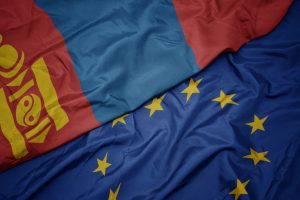This year marks the 35th anniversary of the establishment of diplomatic relations between Mongolia and the European Union. In commemoration of this milestone, Mongolia and the EU are on the path to establishing a strategic partnership.
On May 9, Mongolia celebrated Europe Day in recognition of the anniversary. Europe Day included ambassadors based in Ulaanbaatar as well as representatives from Spain, Latvia, and other EU countries that do not currently have embassies in Mongolia.
In an interview with the Mongolian National Broadcast Services, the ambassador of Germany to Mongolia, Helmut Kulitz, highlighted Germany’s engagement with Mongolia, which is aimed at building a free society, and building peace and prosperity. This year, Germany also became the first EU country to establish a strategic partnership with Mongolia.
As Mongolia’s third-neighbor foreign policy supports strengthening ties with developed countries, the EU and its 27 member states are important economic partners to Ulaanbaatar.
Mongolia and the European Union established official diplomatic ties on August 1, 1989. Although this was a bit of a late start, Mongolia had already established bilateral ties with EU states individually. Hence, establishing official diplomatic relations with the EU made sense to Mongolia’s foreign policy goals.
After Mongolia’s democratization in 1991, Mongolia and the EU signed several important trade agreements, and increased investment, education, and cultural exchanges.
Mongolia’s foreign policy during the 1980s and into the 1990s focused on establishing and strengthening the already existing diplomatic ties to the benefit of the country’s transitioning political and economic system. For example, the 1994 foreign policy concept, although did not specifically reference the EU, did embody policies to bolster bilateral ties with EU member countries.
The 2011 foreign policy concept, on the other hand, specifically included the expansion of relations with the EU under Mongolia’s third-neighbor policy umbrella.
Since establishing diplomatic ties, the EU has shown continued support for Mongolia’s developmental projects, offering financial aid and expert advice for governance, transparency, and recently, energy and environmental issues. The 1993 EU-Mongolia Partnership Cooperation Agreement was upgraded in 2017.
Trade relations between Mongolia and the EU were consistently low until the past few years; then, between 2020 and 2023, EU-Mongolia trade accelerated. EU imports from Mongolia increased from 52 million euros to 123 million euros during that period, whereas exports grew from 439 million euros to 742 million euros. Like most of Mongolia’s partners, the EU mostly imported raw materials and natural resources from the country, amounting to 93 million euros – three-quarters of the total import value – in 2023. In return, Mongolia imported mostly machinery and transportation goods from the EU.
Strengthening its partnership with Mongolia aligns with the 2019 EU strategy on Central Asia despite Mongolia’s geographical location. Mongolia’s natural resources and its management do have similarities to Uzbekistan and Kazakhstan. Hence, upgrading Mongolia-EU relations to a strategic partnership can be beneficial to both parties.
Moreover, since 2020, the government of Mongolia and the EU have been implementing what is known as the “Budget Support for Employment Reforms in Mongolia.” Mongolia has received direct transfers of 130.0 billion Mongolian tugrik, equivalent to 38.5 million euros, under the program, which seeks to “support employment reforms, upgrading of skills and … contribute to increasing the transparency of public finances.”
Considering Ulaanbaatar’s efforts in diversifying its economic and energy sector, bolstering ties with the EU is crucial. The decrease in Mongolia’s foreign direct investment created opportunities for Europe to seek partnerships with Mongolia’s growing economy, industries, and natural resources.
The EU’s foreign direct investment flow to Mongolia has doubled, in comparison to 2011. According to the European Policy Center’s research on Mongolia-EU relations, in 2022, nearly 70 percent of Mongolia’s annual FDI came from the EU’s 27 member states.
The European Policy Centre further emphasized, “Elevating the relationship between the EU and Mongolia to a strategic partnership would offer substantial reciprocal gains. For the EU, it would facilitate access to Mongolia’s critical raw materials reserves – essential for the EU’s green and digital transitions – and strengthen a democratic partner in a key region.”
Mongolia’s landlocked position forces Ulaanbaatar to seek foreign direct investments from both developing and developed countries. The EU’s economic opportunity, combined with Mongolia’s diplomatic ties with EU member states can offer a significant advantage to Mongolia’s development goals.

































